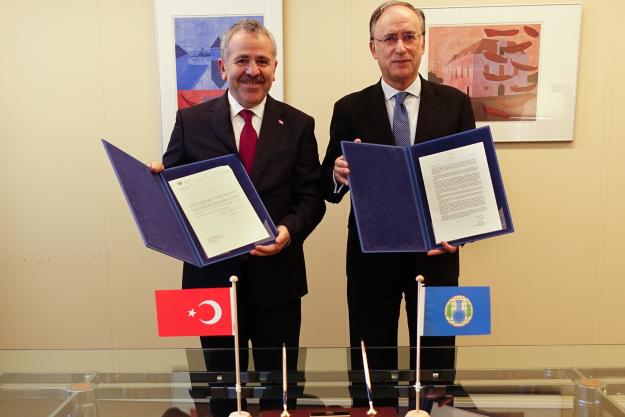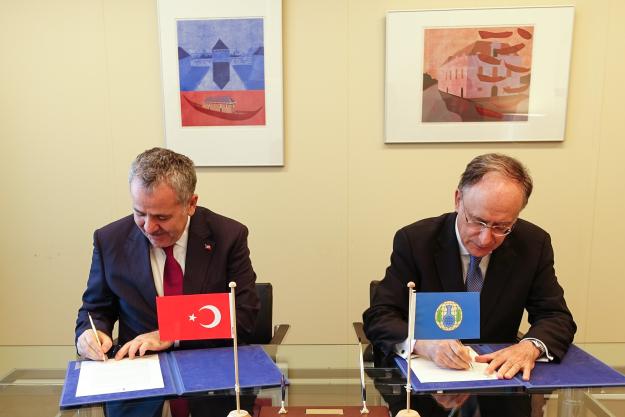
Turkey Contributes € 30,000 to Future OPCW Centre for Chemistry and Technology
Director-General of the Organisation for the Prohibition of Chemical Weapons (OPCW), H.E. Mr Fernando Arias, and the Permanent Representative of Turkey to the OPCW, H.E. Ambassador Şaban Dişli
THE HAGUE, Netherlands —17 October 2019 — The Government of Turkey has contributed €30,000 to a special Organisation for the Prohibition of Chemical Weapons (OPCW) Trust Fund to support the project to upgrade the current OPCW Laboratory and Equipment Store. This project will result in the construction of a new facility, the OPCW Centre for Chemistry and Technology (“ChemTech Centre”).
The contribution was formalised during a ceremony at the OPCW Headquarters between OPCW Director-General, H.E. Mr Fernando Arias, and the Permanent Representative of Turkey to the OPCW, H.E. Ambassador Şaban Dişli.
Ambassador Dişli remarked: “OPCW plays a significant role in the field of disarmament and international security and it is the central actor in the chemical non-proliferation regime. This contribution is another display of the strong commitment of Turkey to the Chemical Weapons Convention and to the OPCW. The transformation of the OPCW laboratory into a Centre for Chemistry and Technology will be a qualitative leap in the Organisation’s capacity to perform its core tasks in verification, inspection and capacity-building. It will contribute to the strengthening of our collective security”.
Director-General Arias expressed his gratitude to the Government of Turkey for its support and appealed to all OPCW Member States in a position to make voluntary contributions to do so. He further emphasised the important role the new ChemTech Centre will play in strengthening the OPCW’s ability to address chemical weapon threats, boost its investigative capability, and enhance capacity building activities.
So far, twenty-one Member States and the European Union have contributed or pledged to contribute financially to the project, and a considerable amount has been raised to date.

Background
The project to build the ChemTech Centre is on-going and seeks to strengthen the OPCW’s capabilities to fully address new and emerging chemical weapons threats, as well as to support capacity building in OPCW Member States. The current OPCW Laboratory and Equipment Store are central to the effectiveness and integrity of the verification regime of the Chemical Weapons Convention, and they also contribute to the OPCW’s capacity-building and international cooperation activities. However, the current facility will soon no longer be fit-for-purpose due to its ageing infrastructure, space constraints, larger workloads, and new missions with new areas of work.
A new facility is required to meet the demands of OPCW Member States for enhanced verification tools, improved detection capabilities and response measures, as well as increased capacity-building activities. The ChemTech Centre will also help the OPCW to keep pace with developments in science and technology and new chemical weapons threats. The OPCW Technical Secretariat is developing a detailed project plan for the construction of the ChemTech Centre, and a Trust Fund for voluntary contributions has been established to secure the required resources for the project.
To date, the following Member States have contributed or pledged to contribute to the project: Bangladesh, Belgium, Canada, China, Estonia, France, Ireland, Italy, Japan, Kazakhstan, the Netherlands, New Zealand, Pakistan, Poland, the Republic of Korea, Slovakia, Slovenia, Spain, Turkey, United Kingdom of Great Britain and Northern Ireland, and the United States of America. The European Union has also contributed.
As the implementing body for the Chemical Weapons Convention, the OPCW, with its 193 Members, oversees the global endeavour to permanently eliminate chemical weapons. Since the Convention’s entry into force in 1997, it is the most successful disarmament treaty eliminating an entire class of weapons of mass destruction.
Over 97% of all chemical weapon stockpiles declared by possessor States have been destroyed under OPCW verification. For its extensive efforts in eliminating chemical weapons, the OPCW received the 2013 Nobel Peace Prize.
